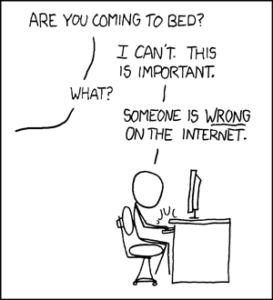Guard Your Mental Space, Part II
Happy Hump Day! Let’s get to work.
Work, that thing we do when we aren’t distracted. Play, too.
The Old Days
Distractions aren’t new. People have been ranting about television commercials almost since the invention of television. Ditto for radio. Phones used to be anchored to walls and you had to literally dial numbers, one at a time, to call someone locally. When salesmen discovered they could always find people at home during dinner, the useful telephone became a primary annoyance.
Even your home was not fully insulated from distractions. Back then, salesmen knocked on doors selling brushes, pots and pans, vacuums, and life insurance.
These were all obvious efforts to gain attention, first, and sales, second.
Killing the Old Ways
There is a difference between voluntarily watching a show - “I want to watch Raylon Givens take on Boyd Crowder tonight” and being involuntarily pummeled by car ads. The thieves say we give permission by watch the show. That is a provable falsehood. They could offer shows the same way movies do. Produce them and charge for each show, an honest exchange on the open market. Why don’t they? Because their revenue would leave a smoking crater on the balance sheet. They know this. Stealing your attention with advertising is more profitable for the producer and the captured attention of the audience means that the advertiser doesn’t have to hand sell individually like the old door-to-door salesmen.
People adapted. The popularity of TiVo and Netflix is directly related to the ability to avoid commercials. Spotify and Sirius Radio do the same with music. People ditched landlines in droves.
Each of these was a way for ordinary people to minimize the efforts of attention thieves.
New Days
One defining characteristic of a marketer is they don’t quit. They invent new ways to capture attention and the creation of the Web made their job easier. We changed mediums, they changed delivery systems. Web banners, flashing ads, auto-launch video and audio, and a dozen other methods are used to distract you. No one reads an article in magazines or newspapers anymore. Those are dying as ad revenue dries up. Instead, we catch the last clickbait-y article on endurance training or world affairs (if you think it isn’t happening in standard news reporting, you’re not paying attention).Everyone of them has at least a couple of ways of sidling ads in under the radar.
They also figured out that getting paid by the click required more clicks, so now we have the “Top Ten Reasons You Won’t Get Laid Tonight” type of clickbait spread over eleven web pages. Sure, they could put it all on one page, but that’s bad for revenue. Both the title and the layout are designed to steal your attention for as long as possible.
Attention Thieves Turned Drug-Pushers
The rise of social media escalated this to new heights. They create an intentionally addictive system to capture and hold attention. Facebook and Twitter are the two leaders for now, with Snapchat, Instagram, and a host of others not far behind. New versions come out daily like Gab. (Disclaimer: I am an investor in Gab.)
The first means they use to addict you is the network effect. Simply put, you need to be on the platform because you may miss out if you aren’t. Network television pioneered this, but Facebook took it to a whole new level. Instead of “Who shot JR?” conversations around a water cooler, we now have constant conversations online.
Facebook has a notification feature that reinforces this, as do the other social media sites. You open a FB page and the first thing you get is a little red emblem with a number. Ever wonder why it is red? Go check your FB page. What else is red?
The second means is the near instantaneous speed of communication. Someone says something dumb, and you can correct them in a nanosecond.  This is a particular problem for me. I have tendencies toward playing the part of Don Quixote, but instead of tilting at windmills, I aim for hypocrisy (others hypocrisies, mind you, not my own.) and stupidity. The end result is squandering emotion and energy into a black hole, but because the inclination of people is to seek a point of status superiority, it is addicting.
This is a particular problem for me. I have tendencies toward playing the part of Don Quixote, but instead of tilting at windmills, I aim for hypocrisy (others hypocrisies, mind you, not my own.) and stupidity. The end result is squandering emotion and energy into a black hole, but because the inclination of people is to seek a point of status superiority, it is addicting.
Equally addicting and for the same status-seeking reason is the effort to rebrand other people as undesirables, deplorables, or untouchables. Ostracizing a person for wrong-think is a trait that predates modernity. If you were too lazy to hunt, you weren’t going to get fed. If you wanted to upset the established order, the established order would dispatch you from the tribe. It was, and is, an effective form of control.
Social media has elevated the sayings of shibboleths to a daily ritual for a great many users. Use the term SJW? You must be Alt-right! Note that both sides have their tests. Well, make that all sides. Social media has a tendency to fracture everything into “Not my tribe” for every activity.
Ostracizing is still happening, it's still a form of bullying, and that isn't going to change any time soon.
What To Do
Television I control by paying for Netflix. No commercials. I use Pandora Plus for music. The landline is gone and the business phone is on mute. I answer my personal phone only for friends and family.
I have three ad-blockers on my web browser. If sites demand I remove them, I keep moving and close the page unless I really want their content.
I have mostly weened myself from Facebook. I’m still there but on my own terms, participating in a few groups. Some of the family is there, so I keep up with them, though daughters still, and will always, get a phone call at least once a week. I limit my time and stay task-focused.
Twitter is my demon.
My tendency to call out stupidity? I have lost hours on Twitter making points only to watch goalposts get moved. Then they invariably block me. For a little while, it was a game. How fast could I get someone to block me using purely rational arguments? That fun fades fast on that, by the way, and I gave it up.
This past week, I tried the Lincoln method to manage my Twitter-bursts. Lincoln famously would write a letter excoriating a critic. Once complete, he put it in his drawer. Days later, feeling better, he consigned it to the dustbin. Over the last week, I probably composed a dozen replies that I ended up erasing. Anne Rice, in particular, seems to have been a catalyst.
The act of writing the tweet was satisfying. The act of deletion was more so as it demonstrated that I was indeed in control.
When most people preach awareness, they talk about in the environment around you. A higher level of awareness is to see and understand how you react to that environment – and adapt your reaction to your goal. Try it. See how it works for you.


